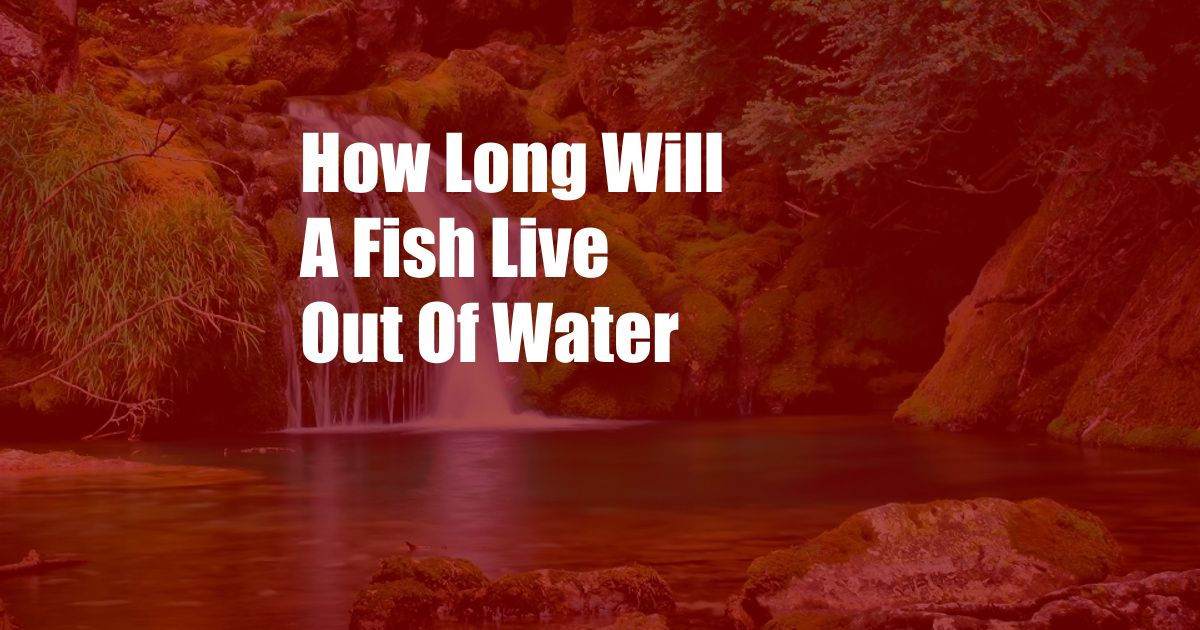
How Long Can a Fish Live Out of Water?
Have you ever wondered how long a fish can live out of water? It’s a fascinating question that has been debated for centuries. In this blog post, we’ll explore the answer to this question, as well as discuss some of the latest trends and developments in this area.
Before getting into the details, it’s crucial to understand that most fish species are unable to breathe air directly. Because they have gills that extract oxygen from water, they require a constant water supply to survive. However, certain fish species, such as mudskippers and lungfish, have adapted to survive out of water for brief periods.
Adaptations for Survival Out of Water
Mudskippers are amphibious fish that can breathe air through their skin and mouths. They have a special organ called a “suprabranchial chamber” that allows them to store water and exchange oxygen with the air. This adaptation enables them to venture onto land and travel short distances, even in search of food.
Lungfish, on the other hand, have true lungs that allow them to breathe air directly. They can survive in water or mud during dry seasons but can also survive on land for several months by burrowing into the ground and entering a state of estivation.
Factors Affecting Survival Time
The survival time of a fish out of water depends on several factors, including species, size, environmental conditions, and access to water. Small fish generally survive shorter out of water than larger fish due to their higher metabolic rate and smaller body mass.
Environmental conditions, such as temperature and humidity, also play a significant role. Fish are more likely to survive longer in cooler, humid environments where they can reduce water loss. Additionally, access to water can be crucial for survival, as fish can absorb oxygen through their skin and gills.
Consequences of Being Out of Water
Prolonged exposure to air can have detrimental effects on fish. As they lose water through their gills and skin, they experience dehydration, electrolyte imbalance, and organ damage. Furthermore, fish may suffer from respiratory distress as their gills dry out, leading to suffocation.
Tips for Keeping Fish Out of Water
If you need to keep a fish out of water for a short period, there are a few things you can do to increase its chances of survival:
- Keep the fish cool and moist: Place the fish in a damp cloth or container and store it in a refrigerator or cooler.
- Minimize handling: Handle the fish gently and as little as possible to reduce stress and physical damage.
- Provide access to water: If possible, keep the fish’s mouth and gills moist by gently dripping water over them.
Conclusion
The answer to the question “How long can a fish live out of water?” depends on the species, size, environmental conditions, and access to water. While most fish species cannot survive out of water for long, some adaptations, such as those of mudskippers and lungfish, have evolved to allow for survival for short periods.
Understanding the adaptations and consequences of being out of water is essential for ensuring the well-being of fish. By following proper handling and storage techniques, we can help fish survive out of water for short periods while also promoting their overall health and welfare.
Are you interested in learning more about the fascinating world of fish and their adaptations? Share your thoughts in the comments below!
Frequently Asked Questions
Q: Can all fish survive out of water?
A: No, most fish species cannot survive out of water for extended periods due to their dependence on water for breathing and osmoregulation.
Q: What are the adaptations that allow some fish to survive out of water?
A: Mudskippers have a suprabranchial chamber for air breathing, while lungfish have true lungs that allow them to breathe air directly.
Q: What are the factors that affect the survival time of a fish out of water?
A: Species, size, environmental conditions, and access to water all influence the survival time of a fish out of water.
Q: What are the consequences of prolonged exposure to air for fish?
A: Prolonged exposure to air can lead to dehydration, electrolyte imbalance, organ damage, and respiratory distress in fish.
Q: How can I increase the chances of survival for a fish out of water?
A: Keep the fish cool and moist, minimize handling, and provide access to water to increase its chances of survival.